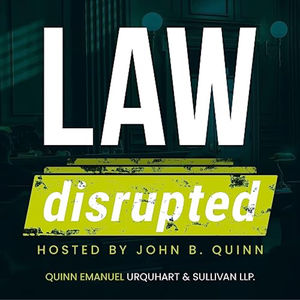In this episode of Law, disrupted, John is joined by Mark Lanier, Founder of the Lanier Law Firm. Mark is consistently recognized as one of America’s premier civil trial lawyers. Together John and Mark discuss the $650.6m award Mark recently won on behalf of two Ohio counties in a bellwether trial against CVS, Walgreens & Walmart for their role in the opioid crisis.
John and Mark begin by discussing the basis of the claims against these pharmacies. Mark explains that because opioids are controlled substances, pharmacies must ensure that a prescription is valid and proper before filling the prescription. Further, pharmacies must notice and resolve any red flags that arise in connection with a prescription before filling it. Mark provides several examples of potential red flags, including (a) several seemingly healthy people presenting prescriptions for the same dose of the same medicine written by the same doctor, (b) a prescription from a doctor located so far away that the customer had to drive by many other pharmacies that could have filled the prescription, or (c) the customer paying for other prescriptions with insurance, but paying cash for the opioids.
John then turns the discussion to how Mark proved at trial that these pharmacies violated their duties on a systemic basis. They discuss the statistical evidence that Mark presented, including the methodology Mark used to sample an appropriate number of prescriptions to see how many raised red flags and how many times the pharmacies resolved those issues before filling the prescriptions. This analysis showed that the pharmacies ignored the vast majority of prescriptions, which raised red flags. John and Mark also discuss policies that stores adopted preventing pharmacists from investigating red flags, including requirements that prescriptions be filled in 15 minutes or less.
They then discuss the defenses Walmart, Walgreens & CVS presented, that they each sold only a small percentage of the opioids sold in the two counties, so their actions could have had only a minimal effect on the opioid crisis. Mark recounts how the defendants’ statistical expert illustrated this point to the jury using pie charts and how he was able to turn those charts against the expert in cross-examination.
The conversation then moves to the damages phase of the trial, including injunctive relief. Mark explains why he focused his presentation on injunctive relief, particularly the costs of the actions the counties would have to take to control the opioid crisis over the next 15 years, rather than estimating the damages incurred to date. They discuss the remediation plan Mark first presented, the defendants’ attempts to poke holes in it, and the scaled-down plan Mark ultimately presented to the court.
John and Mark then discuss what the $650.6m judgment for two small counties in one state would mean when extrapolated to the country as a whole. They explore how these enormous numbers have led the pharmacies to re-evaluate their potential national exposure and the effect this has had on their settlement posture in other cases. They also discuss the current state of opioid litigation in general, including the three buckets of plaintiffs (governmental entities affected by the crisis, opt-outs and hospitals and other healthcare institutions) as well as the three buckets of defendants (manufacturers and importers of opiates, opiate distributors, and pharmacies) and where each group currently stands in terms of litigation and settlement.
John then turns the discussion to the arguments the pharmacies will raise on appeal. Mark explains the pharmacies’ arguments that the case is an unwarranted extension of the law of nuisance, their arguments against the joint and several liabilities, as well as their claim that the jury was tainted by one juror’s alleged misconduct.
Finally, John and Mark discuss some of Mark’s other remarkable trial wins, including the $118m he won in a case that he had earlier offered to resolve for $10,000. This leads to a discussion of how experienced and thoughtful trial lawyers avoid posturing and candidly negotiate the best possible settlements for their clients. They end by discussing Mark’s recent decision to open an office in the United Kingdom, a decision driven by recent changes to mass tort law in the United Kingdom.
Podcast Link: Law-disrupted.fm
Host: John B. Quinn
Producer: Alexis Hyde
Music and Editing by: Alexander Rossi


 199
199 0
0